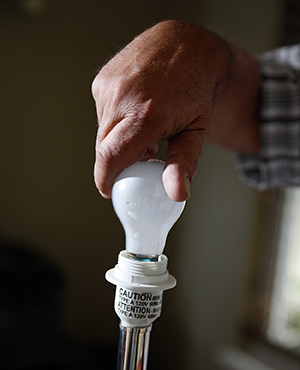Dizziness (Vertigo) and Balance Problems: Staying Safe
Falls or accidents can lead to pain, broken bones, a hospital stay, and a fear of future falls. Protect yourself and others by preparing for episodes. Simple steps can help you stay safe at home and wherever you go.
Lighting
 |
| Replace burned-out light bulbs to keep your home safe and well lit. |
Keep all areas well lit. This helps your eyes send the right signals to the brain. It also makes you less likely to trip and fall. If bright lights make symptoms worse, dim the lights or lie in a dark room until the dizziness passes. Then turn the lights back to their normal level.
Tips:
-
Keep a flashlight by the bed.
-
Place nightlights in bathrooms and hallways.
-
Replace burned-out bulbs. Or have someone replace them for you.
Preventing falls
To reduce your risk of falling:
-
Get out of bed or up from a chair slowly.
-
Wear low-heeled shoes that fit properly and have slip-resistant soles.
-
Remove throw rugs. Clear clutter from walkways.
-
Use handrails on stairs. Have handrails installed or adjusted if needed.
-
Install grab bars in the bathroom. Don't use towel racks for balance.
-
Use a shower stool. Also put adhesive strips in the shower or on the tub floor.
-
Sit down to put on clothes or lace up shoes
Going out
With a little time and preparation, you can get around safely.
Tips:
-
Use a cane or walking aid if needed.
-
Give yourself plenty of time in case you start to get dizzy.
-
Ask your healthcare provider what type of exercise is safe for your condition.
-
Be patient. If an activity, such as walking through a crowded shop, causes you stress, you may not be ready for it yet.
Driving
If you become dizzy or disoriented while driving, you could hurt yourself and others. That's why it's best not to drive until symptoms have gone away. In some cases, your license may be temporarily held until it's safe for you to drive again.
For safety:
-
Ask a friend to drive for you.
-
Take public transportation.
-
Walk to stores and other places when you can.
Support
Don't be afraid to ask for help running errands, cooking meals, and exercising. Whether it's a friend, loved one, neighbor, or stranger on the street, a little help can make a world of difference. Ask your healthcare provider for a list of community resources if you need help maintaining your independence at home.